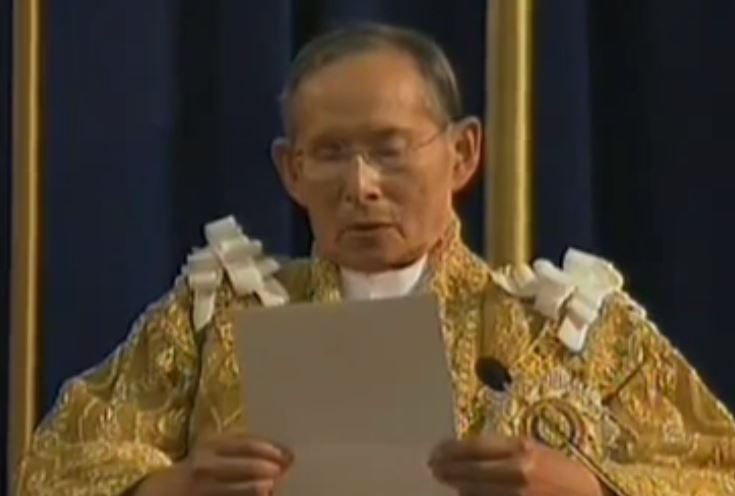King Bhumibol Adulyadej delivered the much-anticipated speech this morning to mark his 86th birthday anniversary at his seaside residence in Hua Hin. Evidently frail, the King managed to read the script throughout, though at time some parts were lost and inaudible. With his shaky voice, the King emphasised what seems to be a traditional quality of the Thai people: unity. He said (unofficial translation by author):
Thailand has been a peaceful nation for a long time; this is because of the existence of national solidarity and because members of society have performed their duty in a complementary manner with each other for the interest of the whole nation. Thais ought to recognise this (situation?) and must continue to perform at the best of their intention for the achievement of common interest; that is safety and security of the Thai nation.
There is nothing new in his speech. Those who expected the King to refer to the current political mess were disappointed. His birthday this year came at a time a new round of political violence has re-emerged. While the anti-government forces, led by former Democrat MP Suthep Thuagsuban, accused the Yingluck government of “being possessed” by the ghost of Thaksin and vowed to eliminate the Shinawatra syndrome from Thai politics, one may have forgotten that the real issue here concerns the fact that the Democrat Party has been unable to compete with the Thaksin faction in the game of electoral politics.
In the mind of Suthep, he may have wished for a royal intervention. Indeed, he has already called for the King to intervene in politics, referring to Article 7 of the constitution stipulating a possibility of a royally appointed prime minister. But already, a large segment of Thai society has voiced its objection against this idea, seeing it as a breach of democratic principle.
The King has long been silent and made no political comments–something so uncharacteristic of him considering his active political role in time of crisis. This is not just because of his ill health, but also because of his long years of self-politicisation. Will anyone, especially in the red shirt camp, listen to what the King has to say today? Surely not, after certain members of the royal family clearly identify themselves with the royalist yellow shirts.
Earlier, rumour has it that the King may declare his abdication, paving the way for the heir apparent to take the throne. This has remained a rumour and the possibility of an abdication has also remained slim. Staunch royalists still need King Bhumibol to serve as a moral authority in balancing what is seen as a Thaksin threat to their own power position. If anything, the King is needed most at this hour. He will also be needed even when the new reign begins. This is simply because the new king will be lacking of both moral authority and personal charisma. King Bhumibol will play a role both now and posthumously as a pillar that underpins the interests of the elite.
But Crown Prince Vajiralongkorn has no longer been passive in the game of politics. Inside sources at the Pheu Thai Party have said that the Crown Prince has slowly moved to take certain responsibilities inside the walls of the palace, thus signalling that the royal transition process has already begun. Since the current round of political conflict has broken out, the Crown Prince has called for a meeting with Metropolitan police commissioner Pol Lt-Gen Kamronvit Thoopkrachang twice, instructing him to convey his message to the opposing camps that they must sit down and talk to each other and that the conflict must come to an end.
The choice of Kamronvit is fascinating. Kamronvit is a close confidant of Thaksin and was hand-picked by the government to head the police department. What remains to be seen is whether Vajiralongkorn’s words would be sacred, like those of his father. Strangely, many in the red shirt movement are clearly fans of Vajiralongkorn, and therefore supporting his new eager role as a political mediator. Some hardcore royalists are still unable to get over his troubled past, but have been forced to swallow this reality of him becoming the next monarch.
It is too soon to judge Vajiralongkorn’s political initiative. The issue here is not so much about whether the next king will become directly involved in politics, like his father, but rather to what extent his political involvement will shape the face of Thai politics in the future, in a way that it could benefit the Shinawatra more than anyone else.
Pavin Chachavalpongpun is associate professor at Kyoto University’s Centre for Southeast Asian Studies.
 Facebook
Facebook  Twitter
Twitter  Soundcloud
Soundcloud  Youtube
Youtube  Rss
Rss 